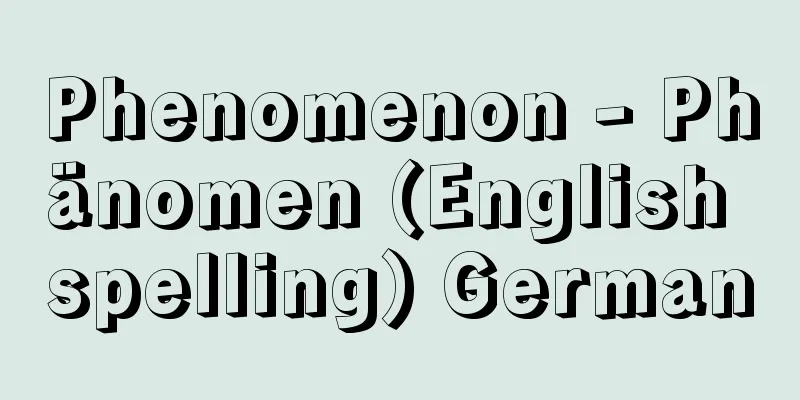Phenomenon - Phänomen (English spelling) German

|
Formally, it refers to the facts that appear to our conscious subject in general. However, depending on how the "form" that appears is perceived, the phenomenon can have various meanings. (1) It refers to all empirical facts that are the subject of knowledge, such as natural phenomena, social phenomena, and mental phenomena. (2) As an "appearance of something," it indicates something other than itself by its appearance. For example, the phenomenon of smoke indicates fire. The existence of fire can be known through the phenomenon of smoke as an "appearance of fire." (3) Phenomena as appearance. Phenomena are separated from and opposed to essence, and phenomena are said to conceal essence, or true reality. There is no truth in phenomena, and essence, or true reality, is recognized not through phenomena (as in (2)), but by removing phenomena as appearances. (4) Phenomena in Kant. It presupposes the framework of the distinction between phenomena and essence, but unlike (3), it is held that the recognition of essence itself is impossible in principle. For Kant, humans can only recognize phenomena that are ordered by time and space, which are intuitive forms, and categories. Phenomena are not mere appearances but empirical realities. Things themselves can never be recognized. (5) The unity of phenomenon and essence. For Hegel, phenomenon represents essence, and all essences appear. The idea that the Absolute itself appears is the basis of Hegelian philosophy. (6) Phenomenon in phenomenology. Heidegger returns to the Greek word phainomenon to define a phenomenon as "that which shows itself in itself." Phenomena do not hide an essence behind them that is never a phenomenon, but it is possible for a phenomenon to be concealed for the time being. The task of phenomenology is to remove this veil and reveal the phenomenon. For Heidegger, the phenomenon of phenomenology is the presence of beings, and ontology is only possible as phenomenology. [Ryoichi Hosokawa] [Reference] |Source: Shogakukan Encyclopedia Nipponica About Encyclopedia Nipponica Information | Legend |
|
形式的にはわれわれの意識主体に現れている事実一般をいう。しかし現れている「すがた」がどうとらえられるかによって、現象はさまざまな意味をもつ。 (1)知識の対象となるすべての経験的事実を意味し、自然現象、社会現象、心的現象などといわれる。 (2)「或(あ)るものの現れ」として、それが現れることによってそれ自身とは別のあるものを指示する。たとえば煙という現象は火を指示している。火の存在は「火の現れ」としての煙という現象を通して知ることができる。 (3)仮象としての現象。現象が本質と分離・対立させられ、現象は本質、真の実在を覆い隠すものとされる。現象のうちにはいかなる真理もないとされ、本質、真の実在は現象を通して((2)のように)ではなく、仮象としての現象を取り除くことによって認識される。 (4)カントにおける現象。現象と本質との区別という枠組みを前提し、しかし(3)と異なり本質そのものの認識は原理的に不可能であるとされる。カントにおいて人間が認識できるのは、直観形式である時間・空間とカテゴリーによって秩序づけられた現象のみである。現象は単なる仮象ではなく経験的実在である。物自体はけっして認識されえない。 (5)現象と本質との統一。ヘーゲルにおいて現象こそが本質を示すのであり、すべての本質は現象する。絶対者自身が現象することがヘーゲル哲学の根本をなしている。 (6)現象学における現象。ハイデッガーはギリシア語phainomenonに立ち返り、現象を「自己をそれ自身に即して示すもの」とした。現象はその背後にけっして現象とはならない本質を隠しているのではないが、現象がさしあたり隠蔽(いんぺい)されていることはありうる。現象学はその覆いを取り除き、現象を開示することをその課題とする。ハイデッガーにおいて、現象学の現象は存在者の存在であり、存在論は現象学としてのみ可能である。 [細川亮一] [参照項目] |出典 小学館 日本大百科全書(ニッポニカ)日本大百科全書(ニッポニカ)について 情報 | 凡例 |
>>: Atomic volume - Gensyou (English spelling)
Recommend
MJQ - MJQ
Please see the "Modern Jazz Quartet" pa...
Kamodani
...Forestry is the main industry, and cedar lumbe...
Tragourion
…A small clay statue with exaggerated eyes and no...
Odantapuri (English spelling)
…It was during this period that Mahayana Buddhism...
AMP - Amplifier
Accelerated Mobile Pages is a project to speed up ...
Colophonium
Colophonium is a colorless or brownish-brown resi...
Lacaune
(7) Dairy breeds: These are breeds kept for the p...
《Engi Gyoki》
…Diary of Emperor Daigo. Also called Engi Goki. I...
Criminal Record - Zenka
Having been convicted and sentenced to a crime. T...
Frog beetle - Frog beetle
…The dog beetle, Linguatula taenioides , parasiti...
Princess Okitsushima - Princess Okitsushima
…〈Kori〉 is an alternative form of Kiri, and 〈Ta〉 ...
Shinto dance - Jinjimai
A dance performed during Shinto rituals. It is th...
speculative fiction
...The three SF genres have developed in complete...
Tsunan [town] - Tsunan
A town in Nakauonuma County in southern Niigata Pr...
dispersion primaire d'âge ancien (English) dispersionprimaire dageancien
…Next, the main criterion for the formation of di...









